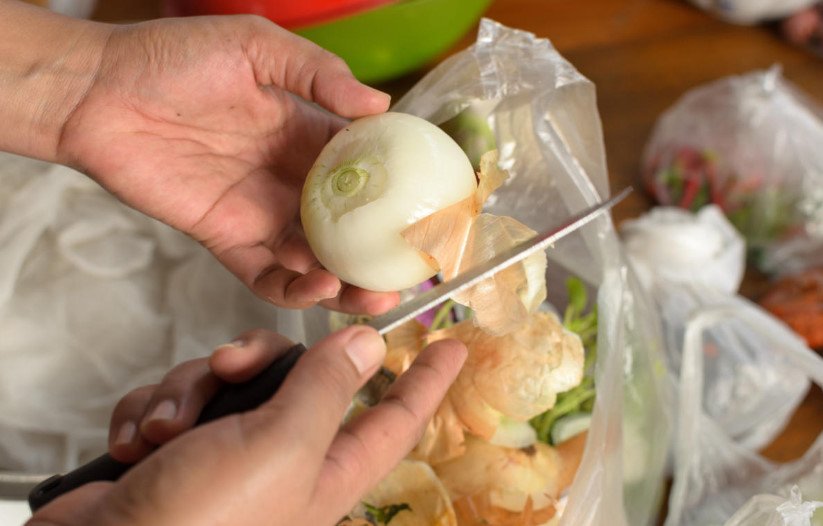
Very soon it will be time to remove the onion. Every housewife knows what to do with the bulbs. But how can you use onion husks? It turns out that there are a lot of useful things in such “scraps” at home and in the country; and they will benefit the plants, and they will help to improve health, and they will bring beauty. Are you still throwing away the husks? Then read it!
1. Onion husks for pest and disease control
Many gardeners add onion husks to the wells when planting potatoes – it is believed that this helps protect the tubers from wireworm. Others use it when planting tomato seedlings – for the prevention of diseases. Decoction or infusion of onion husk is sprayed on any plants for the prevention of diseases and pest control of garden crops.
From aphids, thrips, mites, sawdust, small caterpillars and other sucking and gnawing pests, an infusion is used: 200 g (0.7 oz) of onion husks are poured with 1 liter of water, insist for a day. Strain, squeeze the husk. The resulting infusion is diluted with water, bringing the volume of liquid to 10 liters, and sprayed with any plants. Treatment is carried out every 7-10 days.
Another infusion recipe: 200 g (0.7 oz) of husk per 10 liters of water, insist 4-5 days. Use freshly prepared. Before spraying, you can add a little soap to the solution so that it sticks to the leaves better.
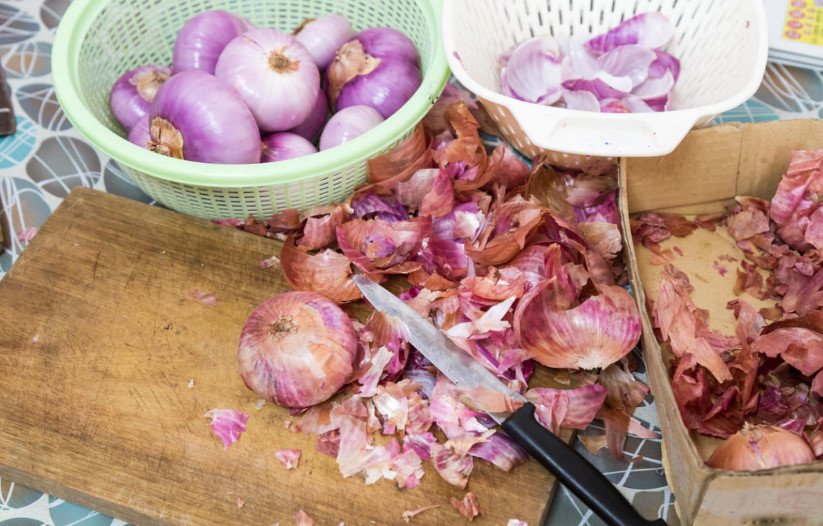
A decoction of onion husks is used for preventive purposes — for watering and spraying seedlings, soaking tubers before planting. It is believed that such treatment increases the resistance of plants to diseases. Prepare the broth as follows: pour 1 cup of crushed husks with 10 liters of water, bring to a boil. Insist, covered with a lid for at least 6 hours, filter, and then immediately consume. It is not recommended to store this decoction.
In the second half of summer, the leaves of cucumbers often begin to turn yellow. There may be many reasons for this, and it is not necessarily the influence of diseases or pests, but onion husks can also help here. Make a decoction from 0.5 kg (1.1 lb) of husk and 10 liters of water (bring to a boil, remove from heat and insist under the lid for 12-14 hours). Strain the finished product, squeeze the husk, dilute the broth with water in a ratio of 1:4. Spray the cucumber lashes liberally with the resulting liquid and pour the soil on the bed.
And for the prevention of rot, cucumbers are advised to treat regularly throughout the season with a infusion of onion husk (pour 2 cups of husk with 2 liters of boiling water, insist for 2 days, strain, dilute with cold water 1:2).
The effectiveness of these folk remedies may cause doubts. Like any medicine, they help in some situations and are useless in others. But it’s not difficult to prepare them, the raw materials are available – so why not check?
2. Onion peel as a fertilizer
For composting, the husk is used together with other plant and food waste. By the way, the husk left after the preparation of decoctions and infusions should also not be thrown away — it will be useful in compost. If a lot of onion waste has accumulated over the winter, they can simply be added to the soil when digging (sometimes it is recommended to grind the husk, mix it with ash and already add this mixture to the soil when planting plants).
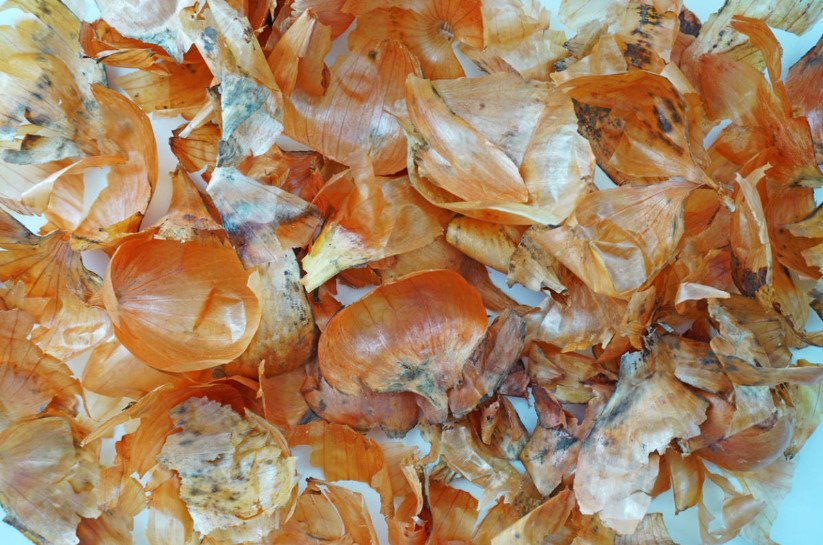
But more often gardeners use the same infusions and decoctions for fertilizing, only in a weaker concentration. To top up vegetable crops, make a infusion of 20 g (0.7 oz) of husk and 5 liters of water (insist for 4 days at room temperature, strain). Tomatoes especially like this “treat”. It is useful to water carrot infusion – it is not only top dressing, but also protection from carrot flies.
You can use decoction: 1 cup of husk per 10 liters of water; bring to a boil, cook on low heat for about 5 minutes; remove from heat, insist for 2-3 hours, strain. This product is suitable for fertilizing both garden crops and indoor plants.
Important! Do not prepare infusions and decoctions for the future — it is recommended to use freshly prepared preparations both for fertilizing and for pest control.
3. Onion peel as a medicinal raw material
Actually, a separate article should be devoted to this topic, because the use of onion husks for medicinal purposes is very diverse. As part of today’s conversation, we will talk about the most general information about the health benefits of onion husks.
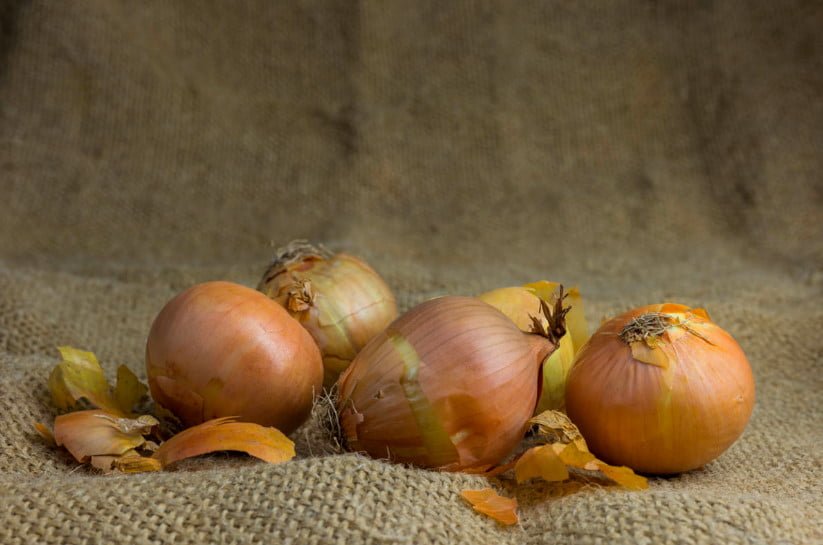
What is useful onion husk
What we often just throw away turns out to have a rich composition: a lot of vitamins (C, E, carotene, B vitamins, PP); a large amount of mineral salts (calcium, potassium, iron); up to 1% fiber, as well as the flavonoid quercetin – a strong antioxidant.
The complex chemical composition is due to a wide range of beneficial effects of onion husks: it increases immunity and improves metabolism; strengthens the walls of blood vessels and improves blood circulation; helps to restore strength after serious diseases and operations, as well as physical and mental fatigue; has bactericidal, anti-inflammatory, wound healing properties; can be used to prevent heart attacks and strokes; diseases of teeth and gums; cancer.
What diseases treats onion husks
Onion husks are used for the preparation of various dosage forms: infusions, decoctions, alcoholic tinctures, ointments, oils. They are used to treat diseases of the bronchi and lungs; amenorrhea and female infertility; atherosclerosis; periodontal diseases; skin diseases.
An aqueous infusion of onion husks is taken to prevent allergic reactions, influenza, acute respiratory viral infections and colds; if you happen to get sick, it is useful to inhale smoke from burnt husks (onions or a mixture of onions and garlic).
Alcohol tincture is used for disorders of the gastrointestinal tract, kidneys; nervous disorders; anemia; metabolic disorders; colds and coughs. Externally, this tincture treats skin diseases and nail fungus; add it to water for rinsing in periodontal diseases. And if the tooth hurts, attach a cotton swab soaked in tincture; this remedy will help relieve the pain.
Onion husk oil is recommended for the treatment of skin diseases; it is also instilled into the nose for colds and used to relieve varicose veins, leg pain and swelling.
4. Onion husks as a natural dye
This method of using the husk is probably known to everyone – Easter eggs have been painted in its broth for a long time.
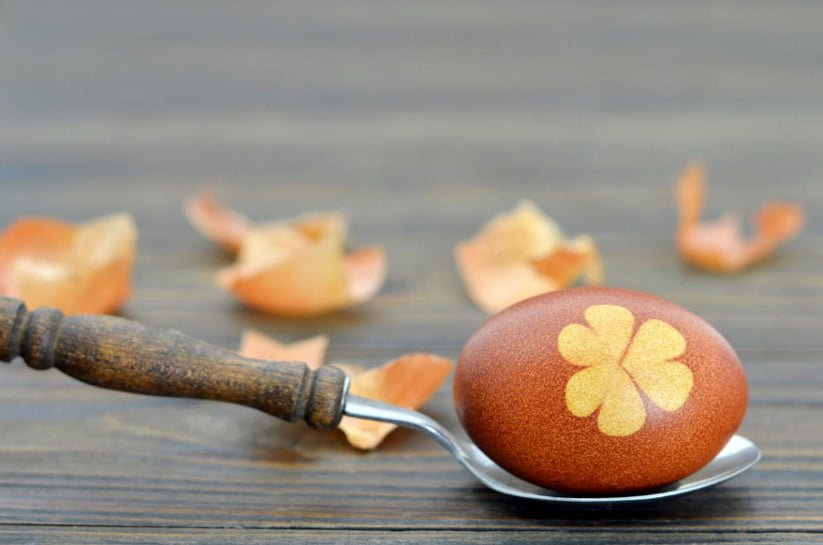
With this tool, you can give the broth a pleasant golden color: it is enough to put the onion when cooking, without peeling it from the covering scales. If you do not like this method, prepare a decoction of husks separately and add it to the broth.
A strong decoction of husks is also used for dyeing natural fabrics and eggs. However, to achieve uniform coloring, you need skill, because the color is not very stable. Fix the color with vinegar and heat treatment.
5. Onion husks for appearance care
The beneficial properties of onion husks are used not only to combat various ailments, but also for hair and skin care.
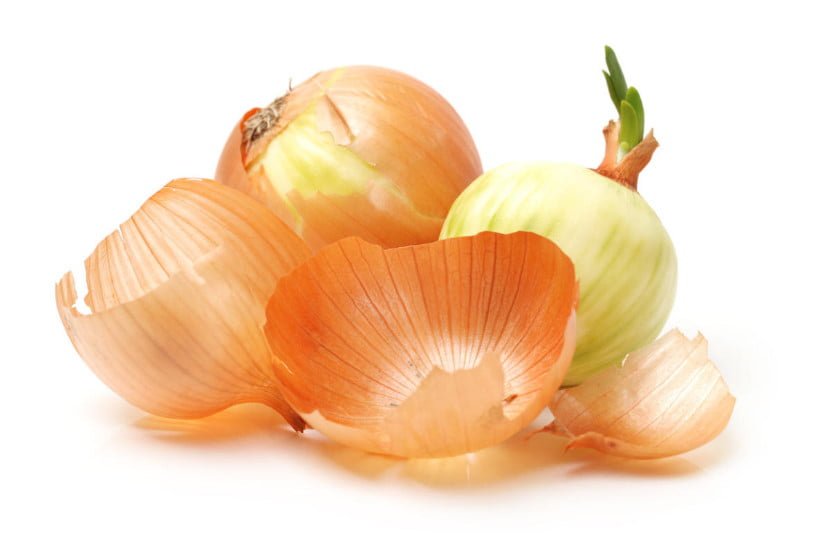
Ointment with onion husk helps to heal small wounds; helps to get rid of warts, dermatitis, nail fungus and skin; is used to strengthen hair. It is prepared very simply: powdered dry husks are mixed with heavy cream (or butter, any natural fat) in a ratio of 2:3. Store in the refrigerator.
The infusion of onion husks is used to strengthen the hair, stimulate their growth. Freshly prepared infusion (pour the husk with cold boiled water in a ratio of 1: 2 by volume, insist for 12 hours, strain) rinse the hair after washing. If you use a more concentrated infusion or decoction, you can give your hair a pleasant shade (from golden to chestnut – depending on the concentration of the product and the natural color of the hair). A rich broth will even color gray hair (although the effect will be short-lived).
Do you use onion husks? For what? Tell us in the comments!


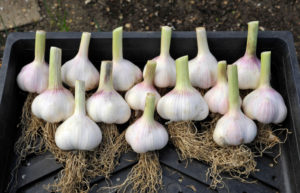

Leave a Reply